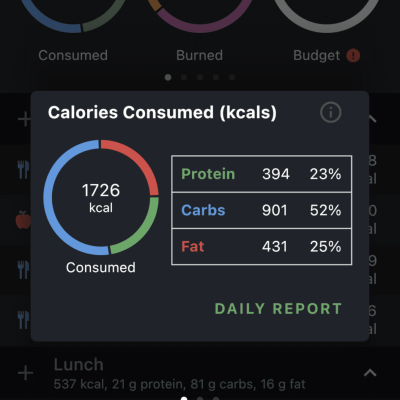Feeling wiped out? Not having the energy to pursue your interests and hobbies can feel like the norm with our busy schedules these days. Try tweaking your nutrition to feel more energized and maintain it throughout the day.
Before we talk about nutrition, there are a couple of things to look at that can have a big impact on your energy. Sleep, stress and physical activity can all make a huge difference on your energy levels.
Try to aim for a similar bedtime and wake up time each day that includes 7-9 hours of shuteye. If you’re experiencing stress in your life, try these stress relieving tips. Physical activity can also boost your energy levels. Though it may be a bit counterintuitive that burning energy can increase your energy, it’s true! Exercise can boost your mood, reduce stress and help you sleep better.
Energy From Calories
Another way to boost your energy is to make sure your body is getting all of the nutrients it needs in order to perform its best. This means hitting all of your targets – your calories, macro and micronutrients.
First, let’s talk calories. Calories (kcal) are the units that describe how much energy is in our foods, and the energy we use to power our bodies. Cronometer will calculate the appropriate number your body needs to survive and thrive with your Energy Summary.
Calories come from the macronutrients: carbohydrates, fat, and protein. Having energy available improves your concentration and physical endurance. If your brain starts feeling a little fuzzy between meals, a quick snack containing carbohydrates can fight off irritability and give you a lift. Add fat and protein to sustain your energy between meals. Aim to get a mix of macronutrients in each meal or snack to get the most benefit.
The guidelines for macronutrient intake are called the Acceptable Macronutrient Distribution Ranges (AMDRs). ADMRs are designed to make sure you’re getting enough of the essential nutrients while also getting enough energy to support your body and mind.
Your Cronometer account will default into guiding you to eating 52% carbs, 25% fat and 23% protein, which fits into the AMDR’s. If you’re on a diet which specifies different ratios or if you’d like to set fixed targets, this setting is fully customizable.

Take a minute or two throughout the day to take stock of your energy levels. Morning, midday and in the evening are great place to start. On a scale of 1-10 are you feeling ready to scale a mountain (10) or is it hard to concentrate and getting horizontal on the couch feels like all you have in the tank (1)?
Cronometer users can log an ‘Energy’ biometric, which will allow you to look back and track your trends over time or chart Energy against any other biometric or nutrient to see if there’s a correlation.
Vitamins & Minerals For Energy Support
Getting energy from macronutrients is a complex process that involves many steps. We couldn’t do it without the help of several micronutrients – vitamins and minerals – that we need to make energy.
If the macronutrients gave an award acceptance speech, they’d be sure to thank thiamin (B1), riboflavin (B2), niacin (B3), pantothenic acid (B5), pyridoxine (B6), choline, iron, magnesium and manganese.
If you’re a Gold subscriber, you can take a look at the vitamins, minerals and metabolism support Nutrition Score to see if you’re hitting these targets.
Hydration Is Key
The human body contains more water than anything else. Water helps to move nutrients around the body and helps to make energy in each cell.
Without enough water, we have impaired physical and cognitive function. While it doesn’t affect our strength, our ability to do aerobic activities is impacted. When we’re dehydrated we feel more fatigued. You may also notice difficulty paying attention, recalling short term memories and doing basic tasks.
Meeting your water needs improves your performance and energy levels. Total water intake includes water in beverages and water found in foods. If you’re wondering how to track water in Cronometer, read this blog post.
Keep an eye on drinking too much water and your electrolyte intake as well.
Caffeine
Caffeine intake, to an extent, can improve your mental reaction time and your ability to focus. Consumption in the range of 35 mg (like a can of cola) to 400 mg (2-3 cups of coffee) per day is optimal. This means you can pay attention to what is relevant, while dismissing information that you don’t need. You can make choices more quickly and recognize what you are looking at sooner. Caffeine enhances your mood so you’ll feel more energetic. How you feel has a big impact on your mood and how much effort and attention you can give. Caffeine is great for maintaining performance for repetitive or uninteresting tasks for a long time.
Effects depend on your sensitivity to caffeine, body weight and how you’re feeling. If you’re sensitive to caffeine, avoid it in the late afternoon or evening as it can interfere with your sleep. On average, it takes 6 hours to remove half of your caffeine intake and 10 hours until it’s effectively gone. Consider your bedtime and caffeinate accordingly!
Summary
There are so many variables which can have an effect on your energy levels. Consistent sleep, physical activity and keeping stress down are all a great start to maximizing your energy.
By tracking your nutrition and hitting your nutrient targets, you’ll make sure that you’re fueling your body with everything it needs in order to be successful.
References
“4 Water.” Institute of Medicine. Dietary Reference Intakes for Water, Potassium, Sodium, Chloride, and Sulfate. Washington, DC: The National Academies Press. 2005. doi: 10.17226/10925.
Tom M. McLellan, John A. Caldwell, Harris R. Lieberman. A review of caffeine’s effects on cognitive, physical and occupational performance. Neuroscience & Biobehavioral Reviews, 2016. 71:294 312. https://doi.org/10.1016/j.neubiorev.2016.09.001




